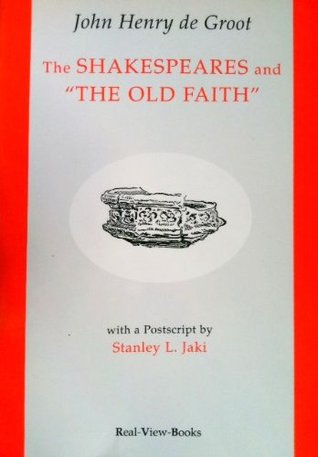For the ongoing revolution against traditional authority it is often difficult to know whom to blame the most, but certainly the academic community’s skepticism, suspicion, and mockery of traditional values is one cause. Deconstructionist scholarship, ideologically “correct” teaching, and the habit of glib irony and irreverence run at flood tide on our campuses. Within the literary canon, writers such as Spenser, Milton, Johnson, Walter Scott, and Tennyson have either disappeared into the hands of specialists or are mined and exploited for bizarre qualities or views.
The single remaining literary exception to this discarding, revision, and reinterpretation of texts is the work of Shakespeare, whose piety and traditionalism somehow retain a unique, and uniquely moral, force. Of the villains in King Lear, for instance, Alfred Harbage said that “even that curious product of our times, the liberalism-gone-to-seed which automatically defends anything from treachery to sadism providing it savors of non-conformity, has found little to say for these insatiable” figures. Shakespearean drama remains a perennial morality play that reaffirms the Natural Law to tens of thousands of readers and spectators each year, despite radical teachers, directors, and “gay” actors. It was a supreme imaginative stroke of genius for Aldous Huxley to use the writings of Shakespeare as the last evidence of spirituality in his “brave new world.” Yet our current immoralism was already evident in Shakespeare’s day: it can be seen in Machiavelli and Marlowe. How did Shakespeare transcend and critique it then?
That Shakespeare was an Aristotelian and a Natural Law thinker and dramatist has been argued by many scholars. But it is the contention of John Henry de Groot’s The Shakespeares and “The Old Faith”—first published in 1946 and now available again, with a new postscript by Stanley L. Jaki—that Shakespeare’s particular loyalty, spiritual and moral, was to Catholicism. The argument is compelling for a number of reasons: De Groot was not a Catholic, but a learned Presbyterian minister; his book was a dissertation based on exhaustive research and done under the distinguished Shakespearean O.J. Campbell at Columbia; and his summary and analysis are painstakingly careful and definitive.
It is Stanley Jaki’s contention that, despite its initially favorable reviews in 1946, De Groot’s book has not gotten the attention it deserves because its argument about the “recusant” Catholicism of the Shakespeare family is distasteful or troubling to prevailing scholarly tastes. From Santayana to Walter Kaufmann to “modernized” productions of the plays, it has long been fashionable to portray Shakespeare as an “existentialist,” preparing the way for the modern, liberated self.
To be sure, there have been exceptions to this view of Shakespeare. The perception of Shakespeare as an orthodox Christian writer has been argued for many years by Professor Roy W. Battenhouse of Indiana University, most recently in his anthology of criticism, Shakespeare’s Christian Dimension (1993). Yet the importance of Catholicism in the life of John Shakespeare and in the life, family, and writing of his son William have been given most judicious treatment by De Groot in this outstanding book. Among other points that De Groot argues convincingly are that John Shakespeare “was a Catholic throughout his life and that his household was infused with the spirit of the Old Faith”; that in school in Stratford, William studied under Simon Hunt, who eventually became “a Catholic, then a Douay Seminary student [in France], and finally a Jesuit”; and that John Shakespeare’s “Last Will and Testament” is authentic and is modeled on that of the famous Milanese Cardinal, saint, and Counter- Reformation polemicist Carlo Borromeo, something mainline Shakespeare scholarship (as in Stanley Wells’s Shakespeare: An Illustrated Dictionary), has conceded, though usually without crediting the pioneering research of Father Herbert Thurston, S.J., and De Groot.
Specifically, De Groot shows how Shakespeare’s poems and plays reflect his religious assumptions, views, and loyalties. Though he is by no means alone in documenting “positive indications of esteem for the old faith” in the Shakespearean corpus, his account is unusually thorough and persuasive. Shakespeare lived at a time when it was illegal and dangerous to adhere to the Roman Church, when many suffered harsh penalties or death for doing so. De Groot’s view is that Shakespeare covertly kept alive his loyalty to “the Old Faith” while outwardly conforming to the state church of Elizabeth and James. (We also know that Shakespeare’s sister and elder daughter were both cited as recusant Catholics.)
The nonspecialist may wonder if and why any of this matters or has contemporary relevance. It does because Shakespeare’s work is the classic example of how traditional literature can conserve, “realize,” and transmit values and beliefs which philosophers and teachers may have “lost the art to verify,” in John Coulson’s phrase. Today, a variety of influences have combined to erode the credibility not only of religious doctrine but of moral behavior itself. Shakespeare’s dogged if covert loyalty to “the Old Faith” in combination with his loyalty to its Natural Law morality makes his genius an enduring source of “decent Godly order” in an age in which the faith is again embattled.
[The Shakespeares and “The Old Faith”, by John Henry de Groot (Fraser, Michigan: American Council on Economics and Society) 276 pp., $16.95]

Leave a Reply